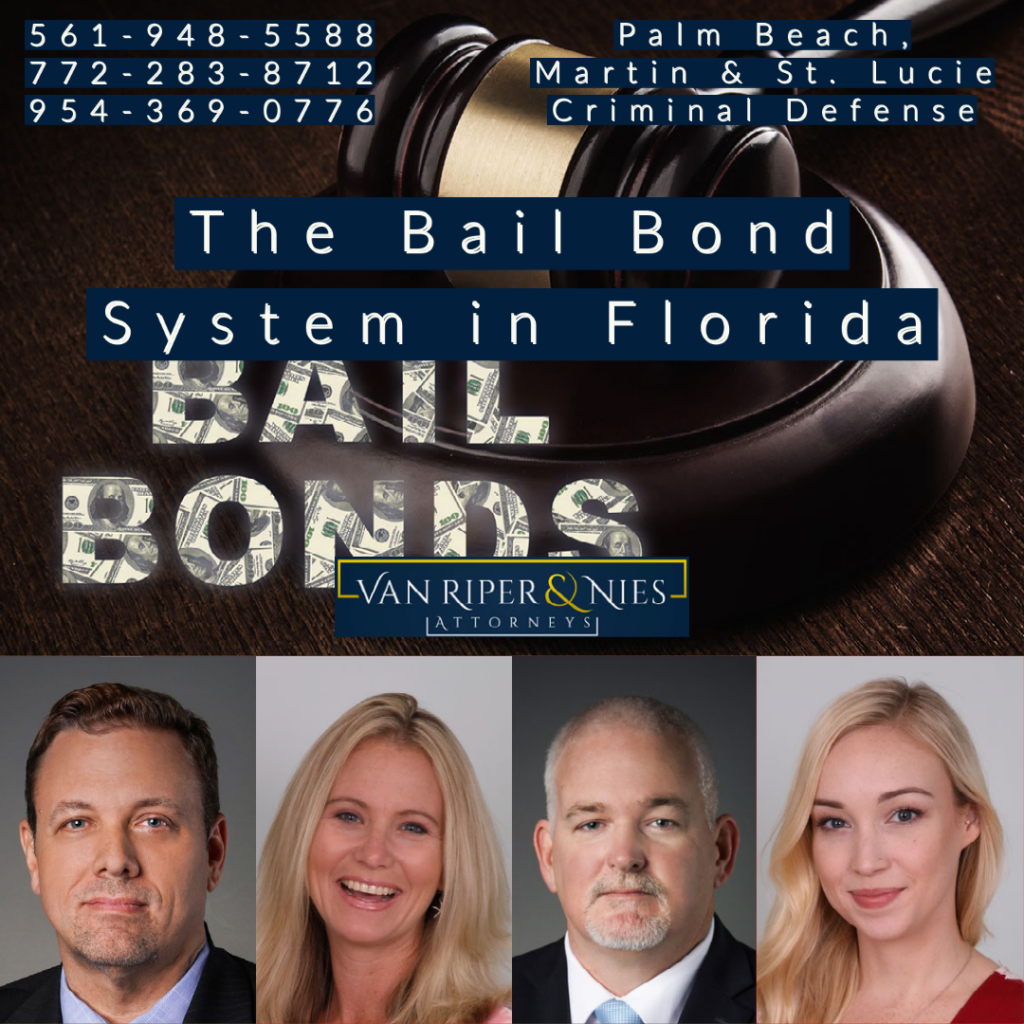
Title: Understanding the Bond Bail System in Florida: Your Guide if Arrested in Martin, St. Lucie, Palm Beach or Broward County
Introduction
When a person is arrested in Florida, one of the key aspects they encounter is the bail bond system. Bail is a process that allows those charged with crimes in Florida to secure their release from custody pending their trial. This article aims to provide a comprehensive overview of how the bond bail system operates in Florida, outlining the key elements and procedures involved. If you, or a loved one, has been arrested, it is best to speak first with our criminal defense lawyer, Christian Van Riper, before contacting a bail bondsman. Mr Van Riper will answer all your questions, day or night, about the bail bond process in Florida, and may be able to reduce the amount of bail. Our law firm has offices in Stuart, West Palm Beach, Delray Beach, Deerfield Beach and Boca Raton, Florida.
The Purpose of Bail
The primary purpose of bail in Florida is to ensure the appearance of the defendant in court for their trial. By requiring a financial commitment, the court aims to incentivize the defendant to attend all future court proceedings. Bail serves as a guarantee that the accused will not flee the jurisdiction, while also safeguarding public safety by keeping potentially dangerous individuals in custody until their trial.
Types of Bail in Florida
In Florida, there are several types of bail options available:
- Cash Bond: This is the most straightforward type of bail, requiring the full payment of the bail amount in cash. Once the case is concluded, and the defendant has attended all court proceedings, the cash bond is returned, minus any applicable fees or deductions.
- Surety Bond: A surety bond involves enlisting the services of a bail bondsman. The bail bondsman pays the bail amount on behalf of the defendant in exchange for a non-refundable premium (typically around 10% of the bail amount). The bondsman assumes responsibility for ensuring the defendant’s appearance in court.
- Property Bond: A property bond involves using real estate or other valuable assets as collateral for bail. If the defendant fails to appear in court, the court may place a lien on the property, allowing it to be forfeited.
- Own Recognizance (OR) Release: In certain cases, the criminal court judge may release the defendant on their own recognizance, without requiring bail. This is typically reserved for non-violent offenders with strong community ties and a low flight risk.
Determining Bail Amount
The bail amount is determined by several factors, including the severity of the offense, the defendant’s criminal history, ties to the community, and flight risk. The Florida judge considers these factors during a bail hearing, where the defendant or their criminal defense lawyer may present arguments for a lower bail amount.
Bail Process
After an arrest, the defendant is brought before a judge for an initial appearance within 24 hours. During this hearing, the criminal court judge determines whether bail is appropriate and, if so, sets the bail amount. If the defendant cannot afford the cash bond, they may explore other bail options like hiring a bail bondsman or seeking a property bond. A criminal defense lawyer may be able to seek a reduction in the bail amount. Again, it is important to first contact a criminal defense lawyer to file the appropriate motion to persuade the judge to reduce the amount of bail. Contact a Florida criminal defense attorney who will explain the bail bond process in Florida and discuss with you filing a motion to reduce bail.
If the defendant secures their release, they must comply with all conditions set by the Florida criminal court, such as surrendering their passport, adhering to travel restrictions, or attending regular check-ins with a probation officer. Failure to comply with these conditions may result in the revocation of bail.
Conclusion
The bond bail system in Florida plays a critical role in balancing the right to liberty of individuals with the need to ensure their appearance in court. By providing various bail options, the system allows defendants to secure their release while awaiting trial. Understanding the types of bail available and the procedures involved can help individuals navigate this process more effectively.
If you or someone you know is arrested in Palm Beach, Broward, Palm Beach, St. Lucie or Martin County, Florida, it is advisable to consult with our criminal defense attorney, Christian Van Riper, to ensure a thorough understanding of the specific circumstances and legal requirements surrounding the bail bond system, as well as filing a motion to reduce the amount of bail. Mr. Van Riper represents clients accused of all misdemeanors and felonies, including, but not limited to: DUI (Driving under the Influence), BUI (Boating under the Influence), Narcotics Offenses, Marijuana and Cocaine offenses, Domestic Battery, Fraud, Theft, Violation of Probation.
Our criminal defense attorney, Christian Van Riper, is a former prosecutor and works quickly for his clients to reduce the amount of bail. Mr. Van Riper is available to meet at any of our criminal defense offices in Stuart, West Palm Beach, Delray Beach, Boca Raton, and Deerfield Beach, Florida. Call us 24/7 to discuss the bail bond system in Florida.
Martin County bail bond reduction attorney: 772-283-8712
Palm Beach County bond reduction attorney: 561-948-5588
St. Lucie County bail reduction lawyer: 772-283-8712
Broward County bail reduction attorney: 954-369-0776